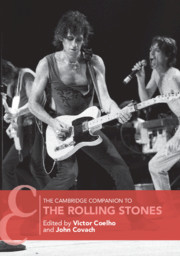Book contents
- The Cambridge Companion to the Rolling Stones
- Cambridge Companions to Music
- The Cambridge Companion to the Rolling Stones
- Copyright page
- Dedication
- Contents
- Illustrations
- Tables
- Notes on Contributors
- Preface
- Abbreviations
- Part I Albums, Songs, Players, and the Core Repertory of the Rolling Stones
- 1 The Rolling Stones: Albums and Singles, 1963–1974
- 2 Guitar Slingers and Hired Guns: The Musicians of the Rolling Stones
- 3 The Rolling Stones in 1968: In Defense of Lingering Psychedelia
- 4 Exile, America, and the Theater of the Rolling Stones, 1968–1972
- 5 Post Exile: The Rolling Stones in a Disco-Punk World, 1975–1983
- Part II Sound, Roots, and Brian Jones
- Part III Stones on Film, Revival, and Fans
- Bibliography
- Index of Songs, Albums, and Visual Media Cited in the Text
- General Index
1 - The Rolling Stones: Albums and Singles, 1963–1974
from Part I - Albums, Songs, Players, and the Core Repertory of the Rolling Stones
Published online by Cambridge University Press: 23 August 2019
- The Cambridge Companion to the Rolling Stones
- Cambridge Companions to Music
- The Cambridge Companion to the Rolling Stones
- Copyright page
- Dedication
- Contents
- Illustrations
- Tables
- Notes on Contributors
- Preface
- Abbreviations
- Part I Albums, Songs, Players, and the Core Repertory of the Rolling Stones
- 1 The Rolling Stones: Albums and Singles, 1963–1974
- 2 Guitar Slingers and Hired Guns: The Musicians of the Rolling Stones
- 3 The Rolling Stones in 1968: In Defense of Lingering Psychedelia
- 4 Exile, America, and the Theater of the Rolling Stones, 1968–1972
- 5 Post Exile: The Rolling Stones in a Disco-Punk World, 1975–1983
- Part II Sound, Roots, and Brian Jones
- Part III Stones on Film, Revival, and Fans
- Bibliography
- Index of Songs, Albums, and Visual Media Cited in the Text
- General Index
Summary
The Rolling Stones are one of the most critically and commercially successful acts in rock music history. The band first rose to prominence during the mid-1960s in the UK, and in the USA as part of what Americans call the “British Invasion” – an explosion of British pop ignited by the UK success of the Beatles in 1963 and their storming of the American shores and charts in early 1964 (see Figure 1.1). The Beatles and the Stones were part of a fab new cohort of mop-topped combos that also included the Animals, the Dave Clark Five, Gerry and the Pacemakers, the Yardbirds, the Zombies, the Kinks, the Who, the Hollies, Herman’s Hermits, and even Freddie and the Dreamers. However much comparisons between the Beatles and the Stones may irritate the faithful of both groups, the similarities and differences can nevertheless be useful. Place of origin matters: The Beatles were not the first pop act from Liverpool to hit it big in London, but they were perhaps the first not to hide their northern roots. Although Brian Jones was from Cheltenham (Gloucestershire), the Stones as a band were, by contrast, from London. Songwriting factors in: John Lennon and Paul McCartney were writing together even before the Beatles were a band, while Mick Jagger and Keith Richards did not start writing until after the Stones had already begun their careers together. Commercial success is also worth noting: The first Beatles No. 1 hit single in the UK was “Please Please Me,” released in March 1963; the first Stones UK No. 1 was “It’s All Over Now,” released in August 1964. “I Want to Hold Your Hand” topped the American charts in late January and February 1964; the Stones’ “(I Can’t Get No) Satisfaction” hit the top of the US charts in the summer of 1965. The most important distinction between the two bands – and the one that probably tells us the most about the stylistic distance between them – has to do with early influences. The Beatles were very much a “song band,” focused mostly on pop songs and their vocal delivery. And while Jagger and Richards were fans of the 1950s rock and roll of Chuck Berry and Buddy Holly, they were also students (along with Brian Jones) of American blues. As a result, the Stones’ music is often more “rootsy,” at times placing more emphasis on expression than on polish.
- Type
- Chapter
- Information
- The Cambridge Companion to the Rolling Stones , pp. 3 - 17Publisher: Cambridge University PressPrint publication year: 2019
- 1
- Cited by

